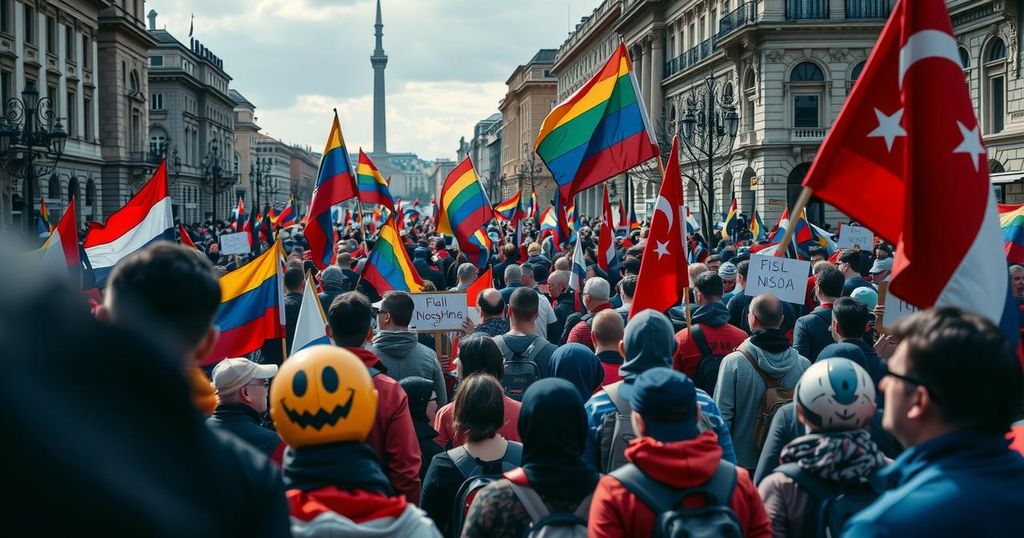Georgian Protests Erupt Against Government’s EU Negotiation Suspension

Demonstrations erupt across Georgia as citizens protest the government’s suspension of EU accession talks, viewed as a shift towards Russian influence. Tensions escalated following Prime Minister Irakli Kobakhidze’s rejection of new elections, and widespread police violence has drawn international condemnation. The protests signify Georgians’ frustrations with the ruling party’s direction away from European integration, sparking unrest in multiple cities.
Widespread protests continue across Georgia as demonstrators express their discontent with the government’s decision to halt negotiations on European Union (EU) accession, a move perceived as a shift towards Russia. The protests, which began on Sunday, represent the fourth consecutive night of unrest fueled by the ruling Georgian Dream party’s decisions. Critics accuse the party of abandoning the nation’s aspirations for greater integration with Western Europe, opting instead for closer ties with Moscow.
The situation intensified following the government’s announcement to suspend EU talks for four years, leading to widespread condemnation of the excessive police response, including the use of tear gas and water cannons against peaceful protesters. Prime Minister Irakli Kobakhidze’s firm rejection of calls for new parliamentary elections further incited public outrage, as he asserted that the formation of the current government, following last October’s elections, was complete.
Despite President Salome Zurabishvili’s appeal to annul the election results, the government remains steadfast, with accusations of the elections being illegitimate marking the opposition’s position. Protesters have gathered predominantly in Tbilisi, where they showcased EU and Georgian flags, with reports of demonstrations spreading to at least eight cities. Many citizens have taken action against the ruling party, including blocking roads and vandalizing party property.
Internationally, both the United States and the European Union have expressed their disapproval of the Georgian government’s actions and their support for the demonstrators. The recent strategic partnership suspension by the United States amid police violence mirrors the concern expressed by various European nations about the escalating tensions in Georgia.
Within the government, dissent is also rising; over 200 diplomats and public servants have issued statements against the decision to suspend EU negotiations, viewing it as contrary to the nation’s constitutional mandates. The protests indicate a broader sentiment among Georgians who resist a regression into Russian influence, a stark contrast to the nation’s recent embrace of Western structures since gaining independence from the Soviet Union in 1991.
As the situation evolves, global attention remains focused on Georgia, with warnings from figures like Dmitry Medvedev of the Kremlin reflecting fears of revolutionary undertones amidst the unrest.
The ongoing protests in Georgia are primarily driven by the ruling Georgian Dream party’s announcement to suspend EU accession talks, a decision perceived as a departure from the nation’s European integration aspirations. Since 1991, following the dissolution of the Soviet Union, Georgia has sought closer alignment with Western nations, including its recent candidate status for EU membership. This movement has been threatened by growing ties with Russia, sparking public outcry against the government’s perceived pivot away from Europe. The protests signal deep discontent with political governance and foreign policy direction, highlighting tensions between pro-European sentiment and pro-Russian influence.
In summary, the protests in Georgia reflect a significant societal divide regarding the nation’s foreign policy orientation, with many citizens firmly advocating for EU integration. The government’s decision to freeze EU negotiations, coupled with the prime minister’s dismissal of calls for new elections, has escalated public unrest. International statements of concern echo the gravitas of the situation, emphasizing Georgia’s strategic importance as a nation caught between Western desires and Russian influence. Consequently, the future trajectory of Georgian politics may hinge upon the current dynamics between domestic discontent and international support for democratic processes.
Original Source: www.aljazeera.com








